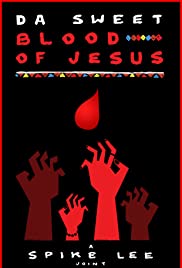
DA SWEET BLOOD OF JESUS
US, 2014, 123 minutes, Colour.
Stephen Tyrone Williams, Zara Abrahams, Rami Malek, Elvis Nolasco, Thomas Jefferson Byrd.
Directed by Spike Lee.
it is difficult to place Spike Lee’s Da Sweet Blood of Jesus (2013) and its focus on Jesus and his death, the shedding his blood, Eucharist and the sharing of his blood. Surprisingly, it seems to have no connection with the 1941 The Blood of Jesus, directed by Spencer Williams an African- American story, quite explicit in its religious themes. Spike Lee’s film is a remake of a horror film, Ganja and Hess (1973, director, Bill Gunn) and incorporates much of Gunn’s original screenplay of the though Gunn had died.
Interestingly, of the reviews that can be found online, practically none of them refer to Jesus, the Gospels or the religious themes. One reviewer remarks that there are religious elements but that they never coalesce into anything compelling (Larson on film). Respected reviewer A.O. Scott of the New York Times, writing of the vampire themes, refers to the subtext of certain new Testament versus that the church pastor, seen at the beginning and the end, seems especially interested in.
What Lee seems to be doing is to use these new Testament texts, made explicit with enthusiastic quoting and repetitions by the pastor, as what T.S. Elliot might have called an “objective correlative�, a metaphorical source of reference for a theme. In this case, it is a vampire theme, acknowledging some Christian traditions from Dracula but actually more interested in African traditions, the use of blood, the consumption of blood with further cravings, that have been transported to the United States through the slaves. The central character is Dr Hess Greene (Stephen Tyrone Willliams), an academic, upper-crust, with a mansion on Martha’s Vineyard, a collector of anthropological items, including a large knife. He is killed by an associate with the knife and turns into a vampire, the film showing him preying on women for blood, meanwhile keeping up his academic commitments, encountering the widow of the man who stabbed him and transforming her.
Eventually, after his vampiric experiences, he grows tired, going back to the church, reminded of the themes of the blood of Jesus, dying under the shadow of the cross.
To that extent, the film is a variation on familiar vampire themes. But, with the title and the gospel texts, Da Sweet Blood of Jesus finds its place in films, Jesus on screen.
1. The title? The African- American phrasing? The reference to the Gospels? The religious ritual, the homily about the Sweet Blood of Jesus? The blood as a symbol?
2. The remake of a horror film, vampire overtones? The use of the original screenplay? With Spike Lee’s perceptions?
3. New York settings, shops? Martha’s Vineyard, the surroundings, the mansion, the sea, the musical score?
4. The church sequence, the Evangelical enthusiasm, the Bishop, his singing, dancing, his homily, the Gospels, the Blood of Jesus? The congregation, men and women, the music? Hess Greene, the back of the church? And his returning there at the end?
5. The sermon, the theology, the Blood of Jesus, sacrifice, redemption?
6. The Christian tradition, the African- American traditions? Adaptation? Blood, the drink for life? The link with the vampire, needing others blood to live? The vampire themes, destruction, new life, continuation of life? The impact for the audiences and the use of the blood imagery?
7. Dr Green, in New York, his associate and admiration, buying the knife the story of the traditions? Going to Martha’s Vineyard, their discussions, the associate and the rope to hang himself, in the bath, stabbing the professor, his reviving, the death of the associate, his body in the freezer? The professor and his continuing on life?
8. His academic career, trips, wealth, limousines… Living in style?
9. The city, the encounter with the prostitute, the discussions, draining her blood? The encounter with the mother and child in the park? Is destroying her?
10. The arrival of the wife of his associate, from England, her presence in style, attitude towards her husband? The demands? Her being welcomed? The attraction between the two? The intimacy of the sexual relationship? The mystery of the professor’s life? Anthropology, the knives, the souvenirs and trophies?
11. The professor taking her blood, the effect on her, gradually accepting it? Their life together?
12. The friend from the past, her arrival, the attraction with the wife, their sexual encounter, her being killed and her blood drained?
13. The effect on the Professor, dealing with his wife, the effect of the blood, the consequences?
14. His change of heart, going to the church, his wanting to repent, to die – and his death, in the shadow of the cross?
15. The wife, the reviving of the friend, the end and their standing on the beach?
16. The film as symbolic? For African- American audiences? The world audiences?